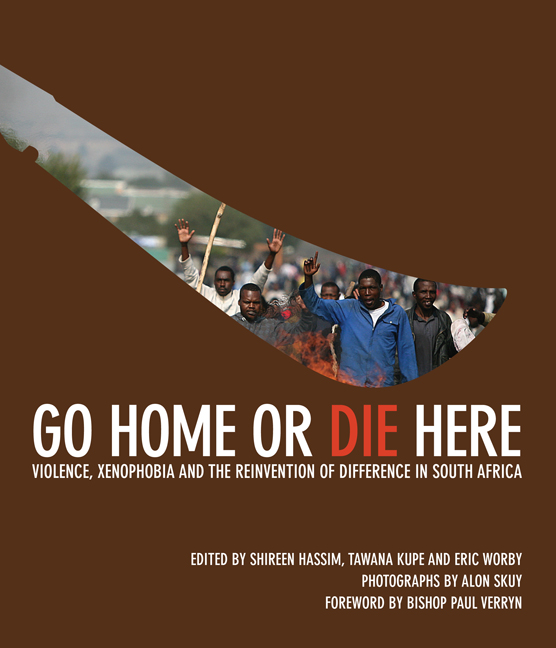Book contents
- Frontmatter
- Table of Contents
- Foreword
- Introduction
- A Torn Narrative of Violence
- I Did Not Expect Such a Thing to Happen
- (Dis)connections: Elite and Popular ‘Common Sense’ on the Matter of ‘Foreigners’
- Xenophobia in Alexandra
- Behind Xenophobia in South Africa – Poverty or Inequality?
- Relative Deprivation, Social Instability and Cultures of Entitlement
- Violence, Condemnation, and the Meaning of Living in South Africa
- Crossing Borders
- Policing Xenophobia – Xenophobic Policing: A Clash of Legitimacy
- Housing Delivery, the Urban Crisis and Xenophobia
- Two Newspapers, Two Nations? The Media and the Xenophobic Violence
- Beyond Citizenship: Human Rights and Democracy
- We Are Not All Like That: Race, Class and Nation after Apartheid
- Brutal Inheritances: Echoes, Negrophobia and Masculinist Violence
- Constructing the ‘Other’: Learning from the Ivorian Example
- End Notes
- Author Biographies
Introduction
Published online by Cambridge University Press: 04 June 2019
- Frontmatter
- Table of Contents
- Foreword
- Introduction
- A Torn Narrative of Violence
- I Did Not Expect Such a Thing to Happen
- (Dis)connections: Elite and Popular ‘Common Sense’ on the Matter of ‘Foreigners’
- Xenophobia in Alexandra
- Behind Xenophobia in South Africa – Poverty or Inequality?
- Relative Deprivation, Social Instability and Cultures of Entitlement
- Violence, Condemnation, and the Meaning of Living in South Africa
- Crossing Borders
- Policing Xenophobia – Xenophobic Policing: A Clash of Legitimacy
- Housing Delivery, the Urban Crisis and Xenophobia
- Two Newspapers, Two Nations? The Media and the Xenophobic Violence
- Beyond Citizenship: Human Rights and Democracy
- We Are Not All Like That: Race, Class and Nation after Apartheid
- Brutal Inheritances: Echoes, Negrophobia and Masculinist Violence
- Constructing the ‘Other’: Learning from the Ivorian Example
- End Notes
- Author Biographies
Summary
On the evening of Sunday, 11 May 2008, a gang of young men in Johannesburg's Alexandra township forced their way into a hostel on London Road and initiated a merciless attack on residents they deemed to be ‘foreigners’. From this spark, the murder, rape, and looting directed at the bodies and belongings of non-South Africans had spread within days from Alex to informal settlements in Diepsloot and the East Rand, where a Mozambican man, Ernesto Alfabeto Nhamuavhe, was burned alive while bystanders laughed. Soon thereafter, similar attacks began to unfold in the provinces of KwaZulu-Natal and the Eastern and Western Cape. South African citizens speaking the ‘wrong’ languages – XiTsonga or SiPedi, for example – were also subjected to violent assault. By the time the violence subsided in early June, some 62 people had died – a third of them South African. Hundreds had suffered grievous injuries and tens of thousands had been displaced from their homes, taking shelter in community halls and police stations, or fleeing in terror across the borders in anticipation of an uncertain future.
AN ANXIOUS RESPONSE
Every instance of large-scale civilian violence towards the innocent provokes a response from those not immediately touched by it. Yet in the catalogue of human brutality unfolding daily around the world, 62 murders over a period of three weeks seems barely worth notice. How many times, over the past five years, have roughly that number of bodies been torn apart by a single bomb in a crowded market in Basra or Baghdad? In a blood-soaked, mediatised world, everyday ethnic or religious violence – much less organised warfare – evokes little more than indifference from the jaded audiences of CNN and BBC World.
Yet the South African story clearly struck a nerve, arousing moral outrage on a global scale: ‘The world watched in shock as a wave of xenophobic violence engulfed South Africa,’ wrote a journalist for Spiegel International Online in an article that bore the title ‘South Africa disgusted with itself’. Had the dream of democratic redemption and reconciliation embodied in the saintly figure of Nelson Mandela reverted to the nightmare of internecine hatred and warfare? Had the daring declaration in South Africa's pioneering Constitution – ‘South Africa belongs to all who live in it’ – been dismissed with contempt by the chanting of xenophobic slogans and the flourishing of machetes?
- Type
- Chapter
- Information
- Go Home or Die HereViolence, Xenophobia and the Reinvention of Difference in South Africa, pp. 1 - 26Publisher: Wits University PressPrint publication year: 2008

